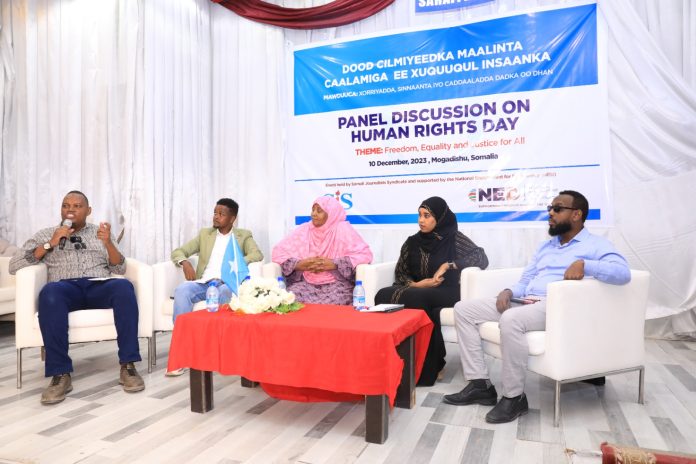MOGADISHU, Somalia 10 December 2023 – On the occasion of Human Rights Day and the 75th anniversary of the Universal Declaration of Human Rights, the Somali Journalists Syndicate (SJS) hosted an engaging panel discussion in Mogadishu, addressing critical challenges faced by human rights in Somalia.
The interactive session, which was televised by local stations, featured diverse panelists discussing key issues, including freedom of expression, women’s rights, the plight of displaced communities, the challenges faced by people with disabilities, and the oppression experienced by minority communities. The overarching theme of the discussion centered on the realization of human rights for all in Somalia, despite prevalent challenges and threats.
During the panel, SJS Secretary of Gender, Anfa Aden Abdi, emphasized the threats against the media, particularly affecting women journalists. Anfa highlighted the impact on female journalists, who often face silencing and reduced productivity due to the threats facing press freedom by noting the detention of female journalist Busharo Ali Mohamed due to her critical reporting in Hargeisa this year.

“We appeal for respect and protection of all journalists including women journalists, and it is simple thing,” she added.
Mohamed Abdisalan Diriye, Chairman of the Somali Disability Rights Advocate, drew attention to the persistent neglect of the rights of people with disabilities, pointing out the systematic exclusion faced by the people with disabilities.

“We are forgotten in every aspect of life,” Diriye said “In universities and schools, individuals with disabilities are often refused admission because there are no suitable classes prepared for them.”
Prominent women’s rights activist Asho Omar Mohamud (Asho Geesdiir) underscored the substantial challenges faced by Somali women in obtaining their full rights. She lamented the low representation of women in politics and the resistance faced from some men in their pursuit of ambitions, emphasizing the plight of women from displacement camps to political arenas.
“The patriarchal culture in Somalia is harsh for women,” she remarked, emphasizing that even Somali nomadic proverbs incorporate elements that devalue women, positioning them as subordinate to men. Asho asserted the imperative need for change, advocating for an end to such cultural norms.
Hussein Mohamed, a New York Times freelance journalist, condemned the ongoing violence against critical journalists in Somalia. He highlighted the killing of colleague Abdifatah Moalim Nur (Qeys) and the arbitrary detention of SJS Secretary of Information and Human Rights Mohamed Bulbul.
“The government was supposed to defend the citizens including journalists, but now the government is the enemy of its citizens and the journalists,” Hussein said while expressing sadness over the targeting of journalists under the administration of President Hassan Sheikh Mohamud, who emerged from opposition.

Professor Hassan Ismail Abdi, an advocate for minority community rights, decried the ongoing oppression faced by minorities in Somalia, stressing the consistent denial of fundamental rights, including access to free education. He shed light on the daily struggles faced by individuals striving for their social rights, attributing the oppression to a government system dominated by powerful clans.
“Our identity has been changed to 0.5 making us look as second-class citizens with no rights. What is even worse is the system itself is designed to create more marginalization against certain communities,” Prof. Hassan noted referring the inequality within the communities.
The panel wrapped up with crucial recommendations, highlighting the significance of fostering freedom of expression, which involves supporting critical journalism and putting an end to impunity for attacks against journalists. The members stressed that this approach could contribute to the amelioration of other human rights issues. Additionally, the panel underscored the imperative of enhancing women’s rights and dismantling cultures that perpetuate violence, hindering women from pursuing their ambitions.
The government, civil society, and international partners were collectively urged to collaborate in safeguarding human rights for all individuals. It was emphasized that achieving peace-building objectives in Somalia would remain elusive unless concerted efforts are made to address the deteriorating human rights situation in the country and holding the perpetrators accountable.
SJS Secretary-General Abdalle Mumin expressed gratitude to the panelists for their courage and time in joining the discussion. He emphasized the event’s significance in shedding light on pressing human rights concerns and fostering collective efforts towards positive change.
“This event and others we have held underscore our commitment as SJS to shedding light on pressing human rights concerns including freedom of expression and fostering a collective effort towards positive change and bringing accountability for human rights abuses in Somalia which we all want to achieve,” Mr. Mumin adds.
SJS extended its appreciation to National Endowment for Democracy (NED) for generously supporting SJS activities.


